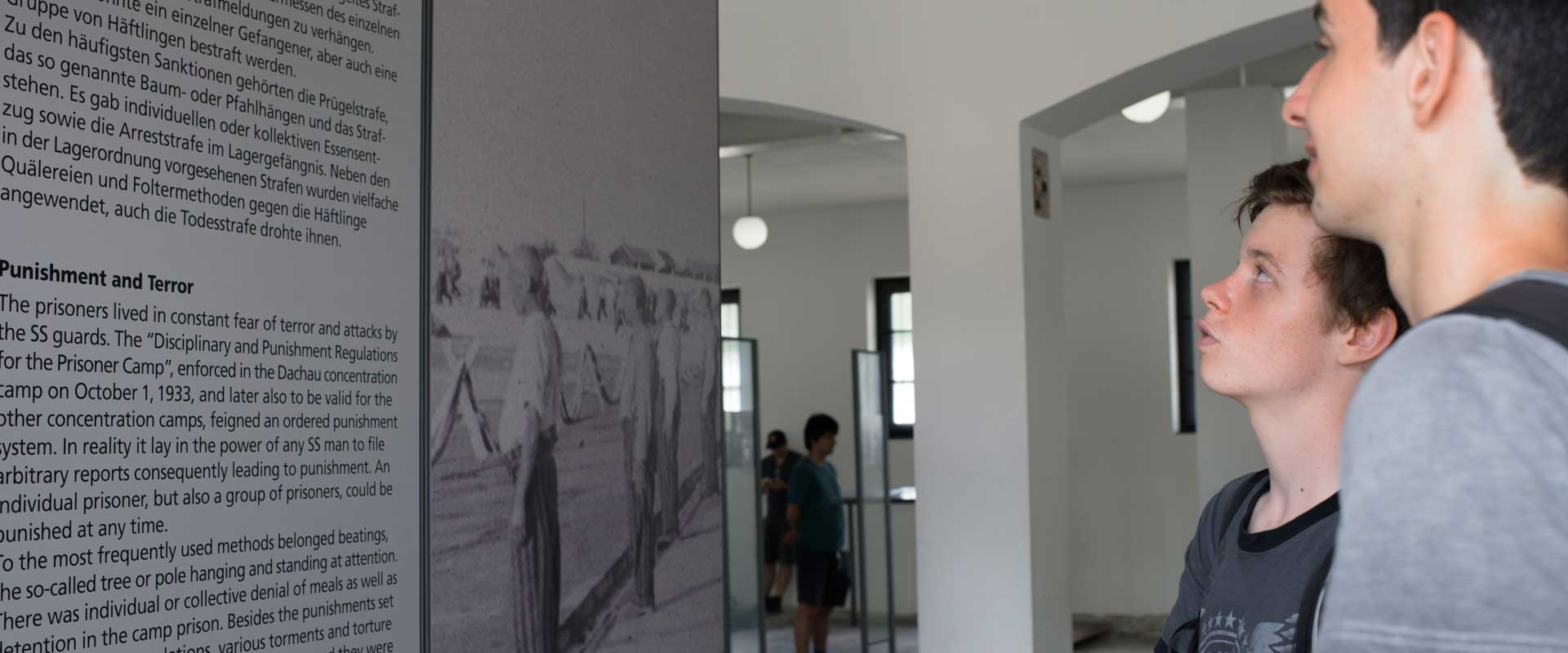
Mission Statement, Max Mannheimer Study Center
Quotes
Given the historical significance and the human-moral dimension of the crimes committed, it is an ongoing obligation, especially towards following generations, to provide a truthful account of the historical events, to keep alive the memory of the victims’ suffering, to show in an understandable way how the experiences of the Nazi period have formatively shaped
our current systems of politics and society, and to assume responsibility for ensuring a humane future that springs from this.
(from the statutes adopted on Nov 14, 1991)
I come as a witness of those years, not as a judge or a prosecutor. I explain to the pupils that they do not bear responsibility for what happened, but certainly for making sure that it never happens again. I hope that through my contribution young people remain sensitive to any developments which endanger democracy and human rights.
(Max Mannheimer, 1920 -2016)
Intro
The Max Mannheimer Study Center is an extracurricular institution active in the field of historical-political and civic education, located in the direct vicinity of the former Dachau concentration camp. Named after the Holocaust survivor Max Mannheimer, the Study Center is committed to continuing his legacy of remembering the suffering of the victims of National Socialist terror and spreading his call for understanding and tolerance. The key components of all of our education programs are the critical discussion and exploration of the origins and rise of National Socialism, the political events that took place in the Nazi period, and the repercussions these have had since, including how they impact on our present day. These programs are divided into three formats:
- Single and multiple day study programs for youths and multipliers
- Trans- and international study programs, youth exchanges and meetings, projects
- Special events and publications for educationalists and scholars
As an educational institution active in contemporary Dachau, a place of remembrance and learning, the Max Mannheimer Study Center is fully committed to supporting local and regional initiatives while also contributing to national and international expertise on memorial site pedagogics and the culture of remembrance.
By whom for who
The education programs of the Max Mannheimer Study Center address youths and young adults from the age of 14 upwards who are attending school or taking part in youth programs as well as multipliers in the fields of education and remembrance work. All the educators active at the Max Mannheimer Study Center are involved in an ongoing discussion on a common pedagogic stance, on the specific subject matter of the programs and their goals, and on methodological approaches. This internal communication process reflects current socio-political events but also takes into account the interests and
aspirations of the program participants as well as the constantly changing circumstances of teaching and learning history, politics, and civic affairs.
With a view to education activities, there is consensus that current forms of racism, antisemitism, rightwing extremism, and other inhumane structures and attitudes need to be clearly defined and a critical position taken. The Dachau Concentration Camp Memorial Site is an international place of remembrance where a diverse array of cultural, historical, and political narratives are tangibly present. International projects and youth exchanges are firmly tied to the founding idea of the Max Mannheimer Study Center. These enable the participants to understand that the history and remembrance of National Socialism and the Second World War involves different historical experiences and interpretations, and that these continue to influence contemporary history (with all its conflicts) in Europe and around the world.
For the program participants, developing the ability to exercise individual judgment on historical and political issues is of enormous significance, contributing to their social learning and fostering an understanding of democratic values and active social engagement.
Content and goals
The core thematic and starting point for historical-political study and learning in the Max Mannheimer Study Center is the history of the Dachau concentration camp. As an instrument of terror in the context of Nazi persecution and extermination policy, the Dachau concentration camp is considered in terms of the actual historical events and the legacy of its repercussions.
Remembering those imprisoned in the Dachau concentration camp, the story of their ordeal and suffering, their self-assertion and resistance, is an essential component of the pedagogic work. Tracing individual biographies is a particularly valuable approach because it makes visible the realities of exclusion, persecution, and camp imprisonment. Exploring the lives of
the victims – seeing them as people acting in response to circumstances – encourages a sense of empathy and understanding.
The role of the perpetrators and the judicial punishment of their crimes are also part of the location’s history. How the history of the camp and acts of persecution were dealt with after 1945 reflects both the controversial debates in society on the Nazi crimes as well as the experiences of renewed social discrimination and marginalization suffered by formerly persecuted groups.
In the participative education process, those taking part develop an individual interest in history that begins from the standpoint of his/her own life, situation, and experience. A historically-informed critical eye then supports them when analyzing and judging current socio-political events.
The Max Mannheimer Study Center ensures that the specific historical-political material is closely interrelated to the applied didactic methods in a dynamic group learning process. The goal of all our programs is to enable the individual participant to gain a better understanding of him/herself and the influences shaping their views. Enhancing the capacity to reflect, this in turn enables a more considered appraisal of different and indeed contradictory perceptions and narratives, which is the very basis for developing an individual position.
Methodological Principles
As an extra-school educational institution, the Max Mannheimer Study Center provides a learning environment enabling the participants to work together with our educators without the pressures of performance criteria. Open communicative spaces are created and, by employing diverse methods and materials, the ability to develop productive historical questions is taught and fostered.
Working in small groups broadens the learning horizon and encourages the willingness to engage in constructive exchange and discussion. Diversity within the group is seen as a positive and productive factor. The participants are able to draw on his/her personal interests and contribute these as input in all our programs.
A pivotal element in the program is first-hand experience of the Dachau Concentration Camp Memorial Site and the opportunity to independently discover the grounds. Here methods of research-based learning are used: multiple-perspective approaches to both the historical and current site, the testimonies of victims and survivors, as well as the sources related to other important historical locations, help participants to come to his/her own interpretation of the past and make connections to the present.
For the pedagogic work of the Max Mannheimer Study Center, the education and development of the individual in a supportive context of ongoing interaction and participation is especially important. The intensity of the educational programs can trigger
long-term learning processes. In turn, this gives rise to questions which, going beyond the specific connection to the location and the historical dimension, touch on the problems of the present. The Max Mannheimer Study Center is always open for new methods and ideas, and is committed to innovative and experimental practices.
Dachau 2016

